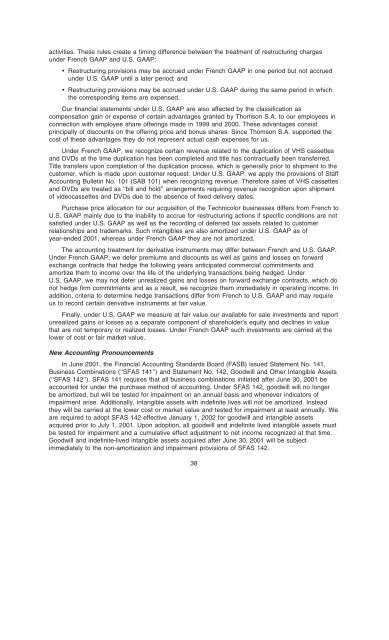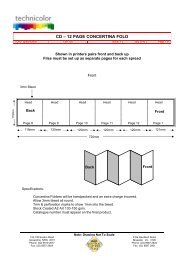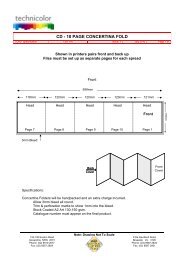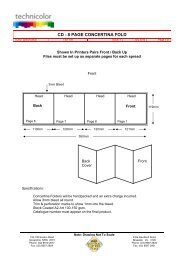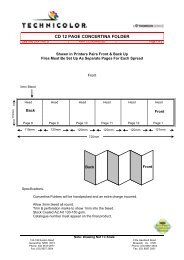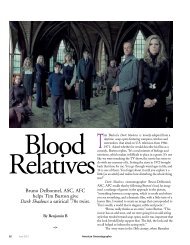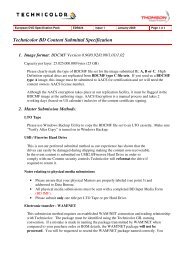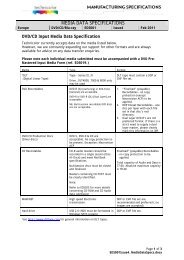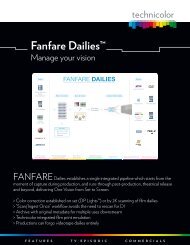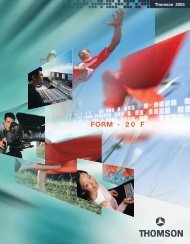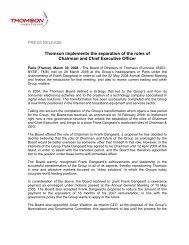FORM 20-F THOMSON multimedia - Technicolor
FORM 20-F THOMSON multimedia - Technicolor
FORM 20-F THOMSON multimedia - Technicolor
You also want an ePaper? Increase the reach of your titles
YUMPU automatically turns print PDFs into web optimized ePapers that Google loves.
activities. These rules create a timing difference between the treatment of restructuring charges<br />
under French GAAP and U.S. GAAP:<br />
) Restructuring provisions may be accrued under French GAAP in one period but not accrued<br />
under U.S. GAAP until a later period; and<br />
) Restructuring provisions may be accrued under U.S. GAAP during the same period in which<br />
the corresponding items are expensed.<br />
Our financial statements under U.S. GAAP are also affected by the classification as<br />
compensation gain or expense of certain advantages granted by Thomson S.A. to our employees in<br />
connection with employee share offerings made in 1999 and <strong>20</strong>00. These advantages consist<br />
principally of discounts on the offering price and bonus shares. Since Thomson S.A. supported the<br />
cost of these advantages they do not represent actual cash expenses for us.<br />
Under French GAAP, we recognize certain revenue related to the duplication of VHS cassettes<br />
and DVDs at the time duplication has been completed and title has contractually been transferred.<br />
Title transfers upon completion of the duplication process, which is generally prior to shipment to the<br />
customer, which is made upon customer request. Under U.S. GAAP, we apply the provisions of Staff<br />
Accounting Bulletin No. 101 (SAB 101) when recognizing revenue. Therefore sales of VHS cassettes<br />
and DVDs are treated as ‘‘bill and hold’’ arrangements requiring revenue recognition upon shipment<br />
of videocassettes and DVDs due to the absence of fixed delivery dates.<br />
Purchase price allocation for our acquisition of the <strong>Technicolor</strong> businesses differs from French to<br />
U.S. GAAP mainly due to the inability to accrue for restructuring actions if specific conditions are not<br />
satisfied under U.S. GAAP as well as the recording of deferred tax assets related to customer<br />
relationships and trademarks. Such intangibles are also amortized under U.S. GAAP as of<br />
year-ended <strong>20</strong>01, whereas under French GAAP they are not amortized.<br />
The accounting treatment for derivative instruments may differ between French and U.S. GAAP.<br />
Under French GAAP, we defer premiums and discounts as well as gains and losses on forward<br />
exchange contracts that hedge the following years anticipated commercial commitments and<br />
amortize them to income over the life of the underlying transactions being hedged. Under<br />
U.S. GAAP, we may not defer unrealized gains and losses on forward exchange contracts, which do<br />
not hedge firm commitments and as a result, we recognize them immediately in operating income. In<br />
addition, criteria to determine hedge transactions differ from French to U.S. GAAP and may require<br />
us to record certain derivative instruments at fair value.<br />
Finally, under U.S. GAAP we measure at fair value our available for sale investments and report<br />
unrealized gains or losses as a separate component of shareholder’s equity and declines in value<br />
that are not temporary or realized losses. Under French GAAP such investments are carried at the<br />
lower of cost or fair market value.<br />
New Accounting Pronouncements<br />
In June <strong>20</strong>01, the Financial Accounting Standards Board (FASB) issued Statement No. 141,<br />
Business Combinations (‘‘SFAS 141’’) and Statement No. 142, Goodwill and Other Intangible Assets<br />
(‘‘SFAS 142’’). SFAS 141 requires that all business combinations initiated after June 30, <strong>20</strong>01 be<br />
accounted for under the purchase method of accounting. Under SFAS 142, goodwill will no longer<br />
be amortized, but will be tested for impairment on an annual basis and whenever indicators of<br />
impairment arise. Additionally, intangible assets with indefinite lives will not be amortized. Instead<br />
they will be carried at the lower cost or market value and tested for impairment at least annually. We<br />
are required to adopt SFAS 142 effective January 1, <strong>20</strong>02 for goodwill and intangible assets<br />
acquired prior to July 1, <strong>20</strong>01. Upon adoption, all goodwill and indefinite lived intangible assets must<br />
be tested for impairment and a cumulative effect adjustment to net income recognized at that time.<br />
Goodwill and indefinite-lived intangible assets acquired after June 30, <strong>20</strong>01 will be subject<br />
immediately to the non-amortization and impairment provisions of SFAS 142.<br />
38


